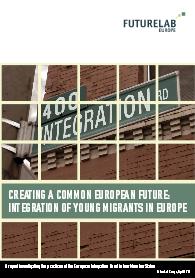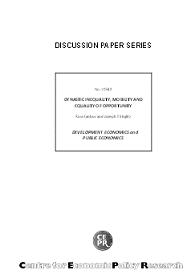Jaumotte, Florence, Osorio Buitron, Carolina, (2015), “Inequality and Labor Market Institutions”, IMF Staff Discussion Note, SDN /15/14, July The rise of inequality in advanced economies, and in particular the growing concentration of incomes at the top of the distribution, has become a greater focus of attention for economists and policymakers. Understanding the factors behind this phenomenon is essential to determine whether policy action is needed to reduce income inequality, taking into account other policy objectives. Traditional …Read More
Does Banking Union Worsen the EU’s Democratic Deficit? The Need for Greater Supervisory Data Transparency
Gandrud, Christopher, Hallerberg, Mark, (2015), “Does Banking Union Worsen the EU’s Democratic Deficit? The Need for Greater Supervisory Data Transparency”, Journal of Common Market Studies, Volume 53, Issue 4, Pages 703–935, July 2015 Does banking union exacerbate the European Union’s democratic deficit? Using Scharpf’s ‘input’ and ‘output’ legitimacy concepts, it is argued in this article that its design does worsen the democratic deficit. There are good reasons to limit ‘input legitimacy’ for …Read More
Causes and Consequences of Income Inequality : A Global Perspective
Dabla-Norris, Era, Kochhar, Kalpana, Suphaphiphat, Nujin, Ricka, Frantisek, Tsounta, Evridiki, (2015), “Causes and Consequences of Income Inequality : A Global Perspective”, IMF Publications, 15 June This paper analyzes the extent of income inequality from a global perspective, its drivers, and what to do about it. The drivers of inequality vary widely amongst countries, with some common drivers being the skill premium associated with technical change and globalization, weakening protection for labor, and lack of financial inclusion in developing countries. …Read More
The Economy Strikes Back: Support for the Eu during the Great Recession
Gomez, R., (2015), “The Economy Strikes Back: Support for the Eu during the Great Recession”, Journal of Common Market Studies, Vol.53, Issue 3, pp. 577-592. This article looks at the role of economic conditions in shaping people’s attitudes to the EU during the Great Recession. In contrast with previous research, findings suggest that in this particular instance support for the EU across Member States was affected by economic factors. In …Read More
Deficits, Democracy and Demographics: Europe’s Three Crises
Hansen, R. & Gordon, J. C., (2014), “Deficits, Democracy and Demographics: Europe’s Three Crises”, West European Politics, Vol. 37, Issue 6, pp. 1199-1222. This article argues that the EU and, above all, the eurozone are facing not one crisis – an economic and fiscal one – but three: an economic crisis, a crisis of institutions, and a crisis of demography. These crises are not simultaneous; they are overlapping and self-reinforcing, …Read More
Public support for European fiscal integration in times of crisis
Daniele, G. & Geys, B., (2015), “Public support for European fiscal integration in times of crisis”, Journal of European Public Policy, Vol.22, Issue 5, pp. 650-670. The current economic crisis has triggered fierce debates among policy-makers and the media across and within European countries about the need for a closer European fiscal union. Using a novel dataset derived from the Eurobarometer surveys, this article investigates European citizens‘ opinions towards such fiscal …Read More
Creating a Common European Future: Integration of Young Migrants in Europe
Creating a Common European Future: Integration of Young Migrants in Europe, A report investigating the practices of the European Integration Fund in four Member States, FutureLab Europe, April 2015. EXECUTIVE SUMMARY: The main purpose of this report is to assess the integration of migrants in the EU by investigating the practice of the European Integration Fund (EIF) in four EU member states: Finland, Germany, Romania, and Spain, virtually …Read More
Dynastic Inequality, Mobility and Equality of Opportunity
Ravi Kanbur & Joseph E. Stiglitz (2015) “Dynastic Inequality, Mobility and Equality of Opportunity“, Centre for Economic Policy Research (CEPR), Discussion Paper No. 10542, April. One often heard counter to the concern on rising income and wealth inequality is that it is wrong to focus on inequality of outcomes in a “snapshot.” Intergenerational mobility and “equality of opportunity”, so the argument goes, is what matters for normative evaluation. In …Read More
The crisis and its impact on unemployed people in Europe Qualitative survey in seven EU Member States
Paugam, S. (2015) “The crisis and its impact on unemployed people in Europe Qualitative survey in seven EU Member States“, Final report for the European Commission DG Employment, Social Affairs and Inclusion, 15 April. As part of the package on “Coping strategies with crisis”, this study analyses experiences of unemployment in a recession and is based on a qualitative survey of a sample of over a hundred unemployed people from …Read More
The Eurozone crisis and the transformation of EU governance: internal and external implications
Rodrigues, Maria João. & Xiarchogiannopoulou, Eleni. & EBSCOhost. (2014). The Eurozone crisis and the transformation of EU governance: internal and external implications. Farnham, Surrey, UK ; Burlington, VT: Ashgate, 15 April 2015. The book comprises the following chapters: Transcending or descending? : European integration in times of crisis / Zoe Lefkofridi & Philippe Schmitter Economic crisis and the internationalisation of EU competition policy / Michelle Cini The transformation of …Read More








